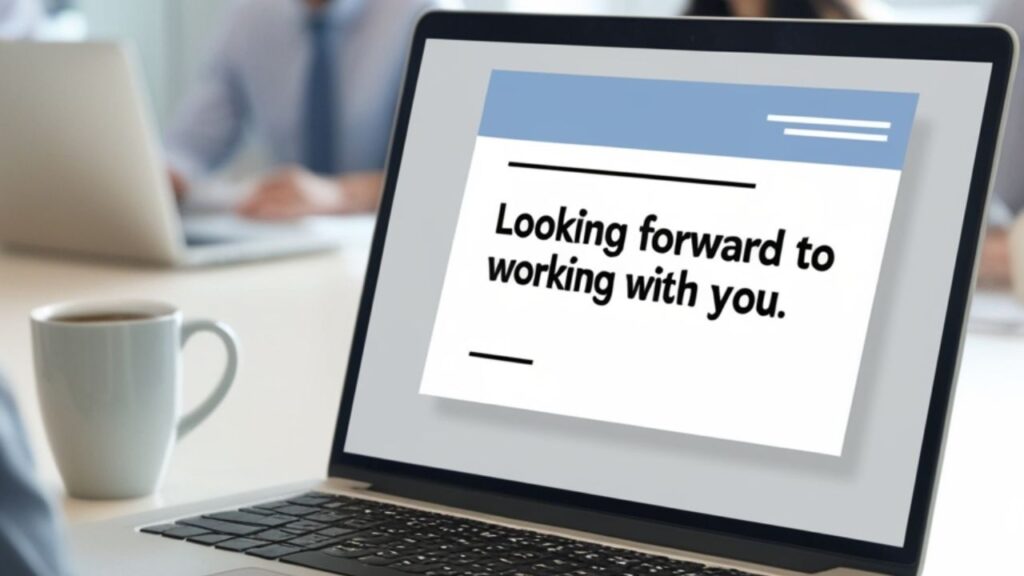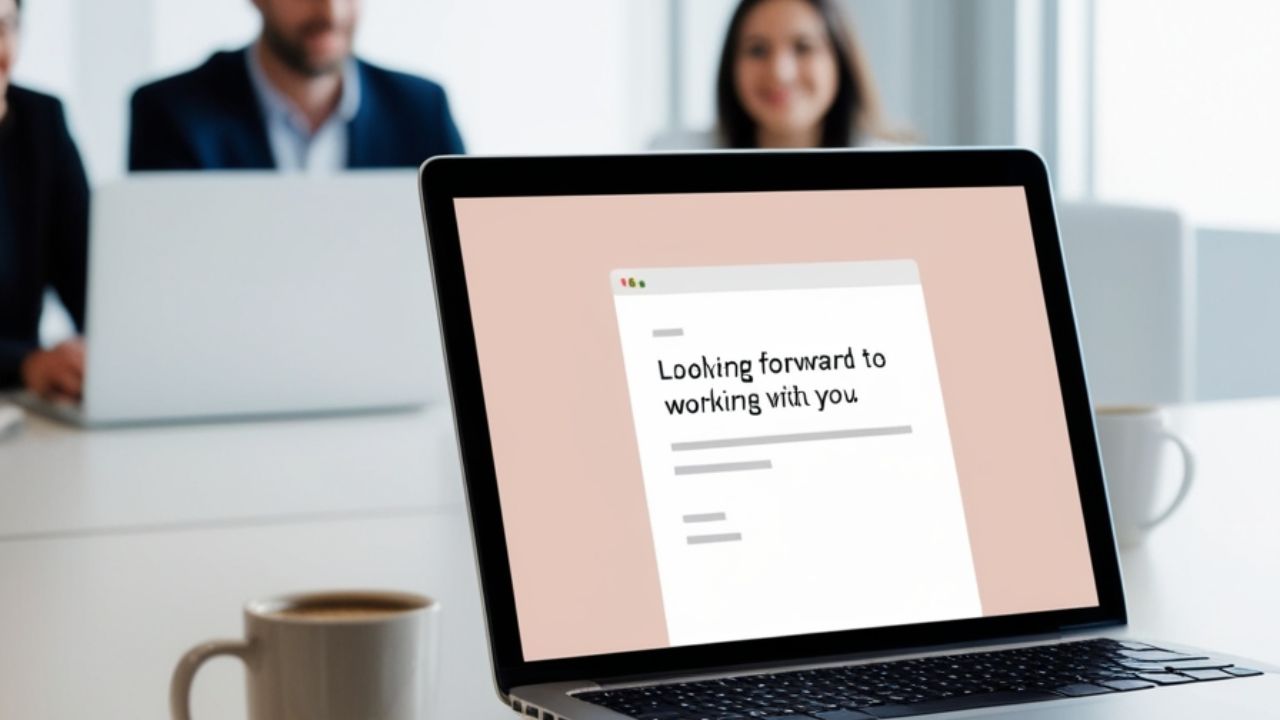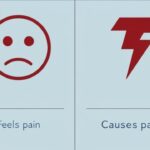The phrase looking forward to working with you is a polite way to show happiness about future teamwork. It helps people feel welcome and respected. When someone uses this phrase, it means they’re ready to start something good together and share ideas kindly.
Using looking forward to working with you makes messages sound friendly and professional. It fits perfectly in business emails or letters. People often use it when they meet new partners, clients, or team members. It builds trust and starts relationships the right way.
Words like looking forward to working with you make writing sound warm and positive. It’s short, simple, and full of good feelings. Using it helps others know that you care about your work and value the people you’ll work with.
Understanding the Phrase: Is “Looking Forward to Working With You” Grammatically Correct?
First, let’s unpack the phrase to understand why it works – and how it fits grammatically.
The Grammar Behind “Looking Forward to Working With You”
- “Looking forward to” is a phrasal verb that means feeling happy or excited about something that will happen soon.
- The word “to” in this phrase is a preposition, not part of an infinitive verb like “to run” or “to eat.”
- After “to”, you must always use a gerund (a verb ending in -ing), so “working” is correct, not “work.”
Why Is This Important?
Many people confuse this with the infinitive use and write “looking forward to work,” which is incorrect. The preposition “to” always pairs with the gerund form in this context.
When Should You Use “Looking Forward to Working With You”?
Knowing the grammar is just the start. The bigger question is when and where this phrase fits in your professional communication. Here are some guidelines:
Appropriate Contexts
- Use it when you’ve agreed to start a project or job with someone and want to show excitement and respect.
- Add it at the end of formal emails or letters to sound polite and professional.
- Use it during introductions or new partnerships to create a warm and friendly tone.
When to Avoid It
- Don’t use it before any agreement is made, as it may sound too early or pushy.
- Avoid it in casual talks or short messages, where it can feel too formal.
- Don’t repeat it too many times in emails, or it may lose its friendly meaning.
The Tone and Formality of “Looking Forward to Working With You”

The phrase looking forward to working with you has a kind and respectful tone. It shows good manners and a happy feeling toward teamwork. People use it in emails or letters to sound polite, friendly, and ready to begin something new.
When someone writes looking forward to working with you, it makes their message sound nice and professional. It helps build a soft and warm mood between workers. This simple line creates a strong start for any good and honest relationship.
| Tone Aspect | Description | Suitable For |
| Friendly | Warm, positive, encouraging | Client emails, team introductions |
| Professional | Polite, respectful | Job interviews, formal project kick-offs |
| Neutral | Polished but not overly casual | Business letters, contracts |
How to Use “Looking Forward to Working With You” in Emails and Letters
Placing this phrase correctly enhances your message’s impact. Here are tips and examples for different scenarios:
Placement Options
- Place it at the end of an email or letter, just before your name or signature.
- Use it in the middle of a message after confirming a project or plan.
- Add it after a thank-you line to leave a warm and positive final impression.
See also Day Off vs Off Day: Clear Meaning & Easy Examples
Examples
Here is an example of using looking forward to working with you in an email: “Thank you for your help today. I’m happy about our project and excited to begin soon.” This line sounds friendly, clear, and full of good spirit.
Another example of looking forward to working with you is in a welcome message: “I’m glad to join your team and can’t wait to start.” It shares warmth and teamwork. These short words help make strong and kind professional connections.
Synonyms and Alternatives to “Looking Forward to Working With You”
| Alternative Phrase | Use Case | Tone |
| Excited to collaborate | Informal, energetic | Friendly, upbeat |
| Eager to get started | Informal, proactive | Casual, motivated |
| Anticipating our partnership | Formal, businesslike | Professional, polished |
| Keen to work with you | Polite, slightly formal | Professional, warm |
| Looking ahead to our cooperation | Formal, optimistic | Polite, forward-looking |
Some good synonyms for looking forward to working with you are “excited to collaborate,” “eager to get started,” and “happy to join the team.” These words share the same warm feeling and help messages sound fresh and full of energy.
Other nice alternatives to looking forward to working with you include “keen to work together” and “glad to be part of this project.” Each phrase spreads kindness and shows real interest in teamwork, helping create a friendly and positive tone.
Building Strong Professional Relationships with Positive Language
Using positive language helps people feel respected and valued at work. Kind words make others feel happy and calm. When messages sound nice and polite, they build trust and make teamwork smoother, helping everyone reach their goals together.
Strong communication grows through positive language that spreads support and care. Friendly phrases create comfort in meetings and emails. They help workers share ideas easily and stay motivated. A kind tone keeps relationships strong and makes the workplace feel bright and welcoming.
- Use kind and respectful words to make others feel valued and comfortable in every conversation.
- Keep your tone warm and supportive to build trust and encourage teamwork.
- Share encouraging messages that show care and appreciation, helping everyone stay motivated and connected.
Common Questions and Misconceptions About the Phrase
Is It Always Appropriate?
Not necessarily. If you haven’t confirmed working together, saying it can appear presumptuous. Wait until a clear agreement exists.
Can It Sound Pushy?
Used excessively or too early, yes. It’s best reserved for moments when collaboration is certain.
Should You Always Follow Up On It?
Not every email needs a follow-up, repeating this phrase. Use it thoughtfully to maintain sincerity.
Best Practices for Using “Looking Forward to Working With You”

- Use it after confirming collaboration or agreement to show genuine excitement and respect.
- Match the tone to your audience — formal for clients, friendly for coworkers.
- Combine it with a polite closing line to leave a warm and professional impression.
Sample Email Templates Featuring “Looking Forward to Working With You”
New Client Introduction
A new client introduction message should sound warm and polite. It’s a way to thank someone for choosing your company and to show excitement about helping them. A short, clear note builds trust and sets the right mood for future teamwork.
When writing a new client introduction, it’s good to share a friendly greeting and a promise to give full support. Simple words make a strong start. This message helps the client feel important and confident about working together.
See also Where Are You Headed or Heading? Grammar Made Simple
Post-Interview Follow-Up
A post-interview follow-up message shows thankfulness and respect after meeting an interviewer. It tells them you enjoyed the talk and still feel excited about the job. This short note leaves a good memory and shows strong interest in joining their team.
Writing a post-interview follow-up also helps you stand out politely. It reminds the interviewer of your skills and good attitude. A few kind lines can show your professionalism, care, and readiness to start a positive working relationship.
Conclusion
In conclusion, polite words make messages sound kind and thoughtful. They help build good teamwork and trust between people. When used in the right way, simple phrases can make every conversation feel friendly, respectful, and full of hope.
A strong conclusion reminds readers to use clear and positive language in their daily writing. Kind words can open doors to new chances and better connections. Small efforts in good communication always bring lasting and happy results.
FAQs:
Which is correct, pajamas or pyjamas?
Both are correct; “pajamas” is used in American English, while “pyjamas” is preferred in British English.
How do Americans say pyjamas?
Americans pronounce and spell it as “pajamas.”
What do Brits call pajamas?
Brits use the word “pyjamas” for nightwear, following British English spelling.
Is pyjamas British or American?
“Pyjamas” is British English; “pajamas” is the American English version.

Join Bibcia on a journey to master English grammar. Discover easy lessons, writing tips, and practical examples designed to make learning grammar simple and effective.










